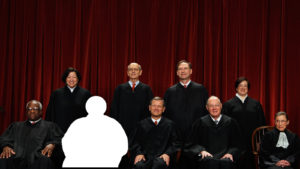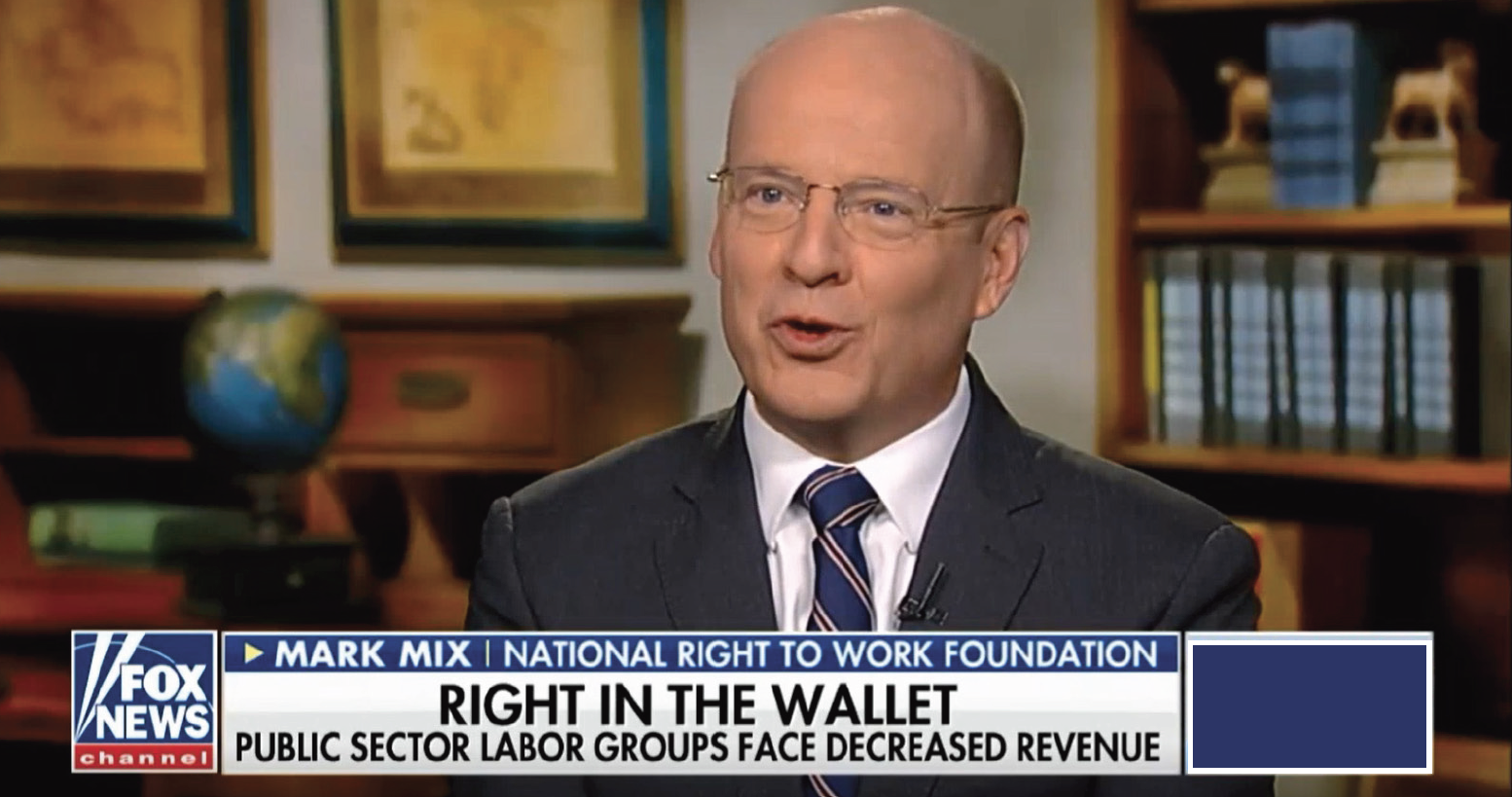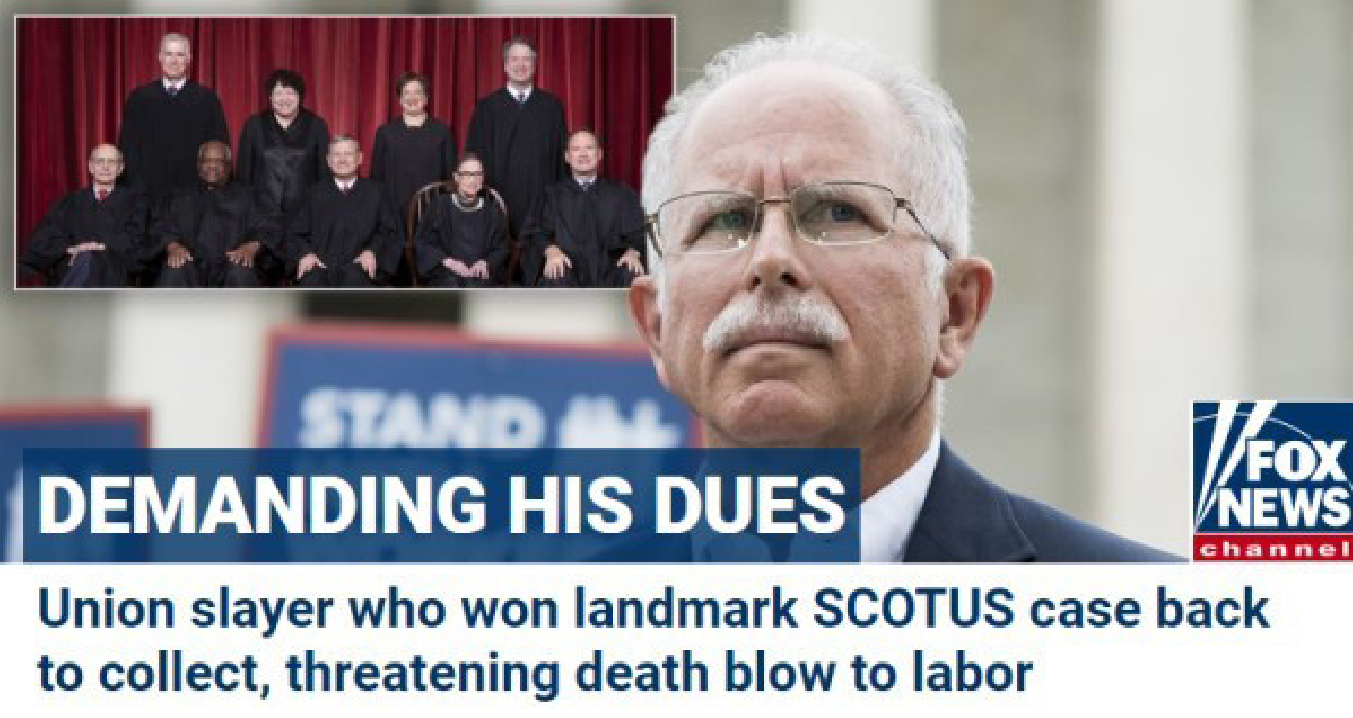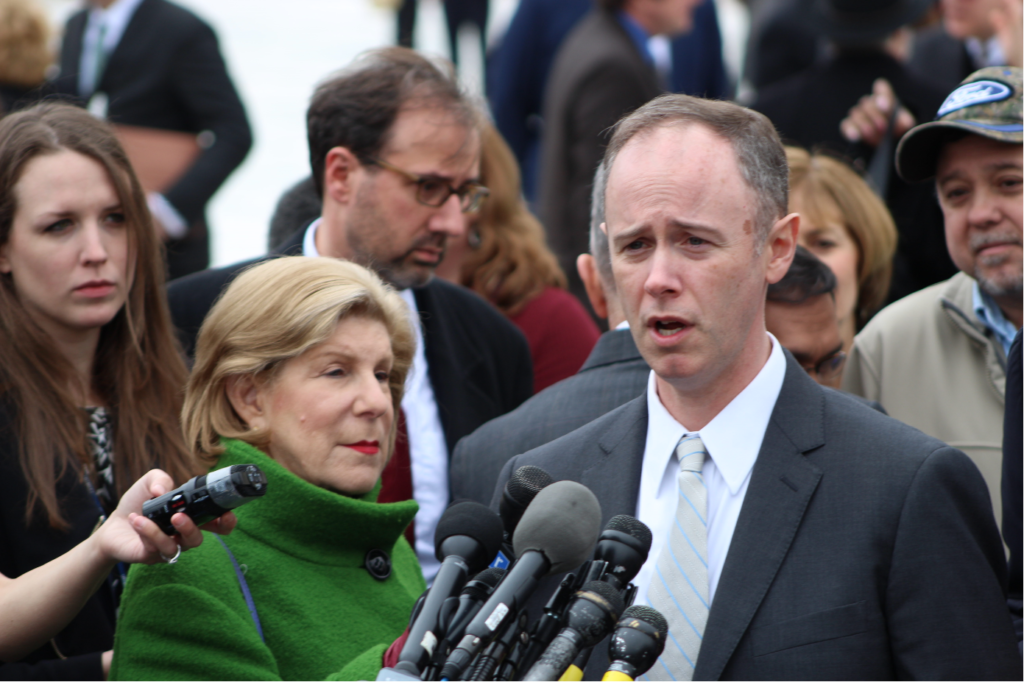Janus v. AFSCME Media Roundup
On June 6 the National Right to Work Legal Defense Foundation petitioned the Supreme Court to hear Janus v. AFSCME a case that could end forced union fees for all public sector employees. The case has generated a lot of media attention. Here are just some samples. Please click the link in the publication name to read the full article.
New York Times – “Last year, the Supreme Court seemed poised to deal a sharp blow to public sector unions. Then Justice Antonin Scalia died and the court deadlocked, granting the unions a reprieve. It may not last long.”
One News Now – “The Janus case is a very important step in our efforts to end the forced payment of fees to a union as a condition of employment,” says Mark Mix of National Right To Work Legal Defense Foundation. “The Janus case specifically deals with government employees. Interestingly enough, if we win at the Supreme Court, which we fully intend to do, it would protect every government employee in America from being fired for failure to tender dues or fees to a labor union.”
Washington Free Beacon – “The Supreme Court could revisit a 40-year-old precedent that allows government agencies to force public sector workers to pay union dues, an issue the court deadlocked on in 2016 following the sudden death of Antonin Scalia.”
Illinois News Network – “Foundation President Mark Mix said this is about compelled speech vs. free speech.Mix said what’s happened is there’s “a private institution in between taxpayers and elected officials and [the union] is able to speak for government employees that, heretofore, never asked for, never wanted, and in fact stand back and say, ‘I don’t want you to speak for me,’ as [plaintiffs] have said in this case,” Mix said.”
Foxnews.com – “It’s the state’s burden to justify infringing on a worker’s association rights,” he said. “The key is there’s no difference between collectively bargaining with the government and lobbying the government. If you can’t force people to pay to lobby the government, then you can’t force them to pay union dues or exclusively bargain with them.”
SCOTUSBLOG – “With Justice Neil Gorsuch now on the bench, however, Janus hopes that the Supreme Court will seize its third opportunity to reverse Abood. ”
Washington Examiner – “The case, called Janus v. American Federation of State, County and Municipal Employees, asks whether an Illinois state government employee can be forced to pay a so-called “security fee” to the union as a condition of employment. Such fees are common provisions in public-sector union contracts. Losing them would be a severe financial blow to the unions.”
Minnesota Court Employees File Federal Lawsuit Challenging Public Sector Forced Union Dues
Workers’ case follows up on Supreme Court split on constitutionality of mandatory union fees for government employees
Minneapolis, MN (June 8, 2017) – Assisted by National Right to Work Legal Defense Foundation staff attorneys, two Minnesota court employees are filing a lawsuit in federal court challenging the constitutionality of public sector union officials’ forced dues powers. The case being filed today argues that the state requirement that the plaintiffs pay union fees as a condition of government employment violates the First Amendment.
Carrie Keller is a Court Administrative Assistant, and Elizabeth Zeien is an Accounting Technician; both are employed by the State of Minnesota Court System. When they started working for the State, neither was a union member, and they both negotiated their own terms and conditions of employment and salaries, free from union interference.
In 2015, union officials started proceedings to force a number of state employees who were not in monopoly bargaining units into union ranks, where they could be required to pay union dues and fees. Ultimately, in March 2017, Minnesota state officials complied with the Teamsters’ demands and added a number of employees, including Keller and Zeien, to a Teamsters controlled bargaining unit without the employees’ permission or desire. Keller, Zeien and the other employees were never given a vote on whether they should be part of the union bargaining unit, and they objected to the new scheme.
Before being summarily forced under the union contract, Keller and Zeien had negotiated pay scales and benefits for themselves that equaled or exceeded what they received under the union-mandated contract. The lower compensation under the union contract and the imposition of mandatory union fees led Keller and Zeien to approach the National Right to Work Foundation for assistance in challenging the forced unionization scheme.
“These two workers were happily working and successfully representing themselves in dealing with their employer until Teamsters officials sought to bolster they forced dues ranks even though it meant a step back in their working conditions,” said Mark Mix, president of the National Right to Work Foundation. “This case is a prime example of the power of worker freedom being destroyed by union boss interference and why it is wrong to force employees to pay money to a union for representation they don’t want and never asked for.”
Nearly 40 years ago, the Supreme Court ruled in Abood v. Detroit Board of Education that public-sector workers could be compelled as a condition of employment to pay union fees. However, in two recent National Right to Work Foundation-won Supreme Court decisions, Knox v. SEIU (2012) and Harris v. Quinn (2014), the High Court suggested it is ready to revisit the 1978 precedent in Abood, expressing skepticism about the constitutionality of public sector union officials’ forced-dues privileges.
National Right to Work Foundation staff attorneys currently have seven other ongoing cases challenging the mandatory union payments as a violation of the First Amendment, including Janus v. AFSCME – on behalf of a Illinois government employee Mark Janus who is forced to pay fees to AFSCME union officials – which is currently before the Supreme Court on a petition for certiorari.
Iowa Teacher Moves to Defend Union Bargaining Reform Law from Union Lawsuit
National Right to Work Foundation staff attorneys help Iowa teacher file Motion to Intervene in support of the recently passed reform legislation
Des Moines, IA (March 29, 2017) – With free legal representation from National Right to Work Legal Defense Foundation staff attorneys, a Waverly-area school teacher has filed a motion to intervene in the recently filed lawsuit attacking Iowa’s new government union reform law. Kevin Rohne, a public school special education teacher, seeks to intervene in the court case (AFSCME v. State of Iowa) to defend the law, which limits union monopoly bargaining powers and mandates regular recertification elections to determine if union officials are actually supported by the rank-and-file they claim to represent.
Mr. Rohne wishes to intervene to support the law because his rights are at stake as a public sector worker currently forced to accept government mandated union bargaining. Rohne opposes having government-imposed union “representation” and supports efforts to eliminate or reform monopoly bargaining powers granted to union officials under Iowa law.
The unions’ complaint asks the court to overturn the recently-enacted public sector union bargaining reform law. This law, which passed the Iowa legislature on February 16, is similar to Wisconsin’s Act 10 legislation which also instituted yearly renewal elections for most public sector unions and rolled back union monopoly bargaining powers.
Wisconsin’s Act 10 law faced multiple union legal challenges but was ultimately upheld in all of the cases. Moreover, the 2007 National Right to Work Foundation-won U.S. Supreme Court case Davenport v. WEA reaffirmed the right of the states to pass laws limiting compulsory unionism powers granted to public sector union officials.
Rohne’s motion is particularly important at this time due to the fact that the state official charged with defending the law, Iowa Attorney General Tom Miller, has publicly refused to defend the law in court. Miller in the past has been supported by the same public sector unions that are affected by the new law.
“It is outrageous first, the Attorney General will not do his job and secondly, that AFSCME union officials reject the right and the authority of the Iowa legislature to reform the extraordinary monopoly bargaining powers that were previously granted to them by the legislature,” said Mark Mix, President of the National Right to Work Foundation. “Public sector monopoly bargaining elevates the voice of a single organization speaking to the government over the voices of the tens of thousands of workers and taxpayers who elect the government. The Foundation will proudly continue to represent workers who seek to defend their rights against union boss-lawsuits, as it did in helping to defend Wisconsin’s Act 10.”
National Right to Work Foundation Staff Attorney Argues Case Before 7th Circuit Court of Appeals Challenging Forced Union Dues
Janus v. AFSCME could be next U.S. Supreme Court case to decide constitutionality of mandatory union fees for public employees
Chicago, IL (March 1, 2017) – On Wednesday, the U.S. Court of Appeals for the Seventh Circuit will hear oral arguments in Janus v. AFSCME, a case challenging mandatory union fees paid by government workers in Illinois. This case builds on recent Supreme Court decisions Knox v. SEIU (2012) and Harris v. Quinn (2014), both of which were won by National Right to Work Legal Defense Foundation staff attorneys.
In Janus, the plaintiffs are two Illinois government employees who are represented by staff attorneys from the National Right to Work Legal Defense Foundation and the Liberty Justice Center.
Under Illinois law, union officials are empowered to require government employees to pay money to a union as a condition of employment. Although state employees aren’t forced to be full-fledged union members, they are required to pay mandatory dues or fees to a union or be fired. This lawsuit seeks to end that practice on the grounds that these fees violate the plaintiffs’ First Amendment rights.
A victory for the Janus plaintiffs would impact millions of government employees who currently can be fired for refusing to pay dues or fees to union officials. The National Right to Work Foundation currently has seven cases across the country on behalf of public employees seeking a ruling that mandatory union fees violate the First Amendment, with Janus most likely to reach the U.S. Supreme Court first.
In 2016, because of the untimely death of Justice Antonin Scalia, the High Court split 4-4 in Friedrichs v. California Teachers Association, a case that would have also ended forced dues for public employees. A new justice will be the deciding vote should Janus or another case presenting the issue be taken up by the Supreme Court.
National Right to Work Foundation President Mark Mix commented, “Hopefully the Seventh Circuit will rule quickly so the case can go to the Supreme Court, which should uphold the First Amendment by ending the injustice of forcing public employees to pay tribute to union bosses as a condition of working for their own government.”
Check out the lead article in the January/February 2017 Foundation Action Newsletter “Foundation Cases Poised to Challenge Forced Dues at Supreme Court”
Foundation Cases Poised to Challenge Forced Dues at Supreme Court
Cases to overturn forced dues could quickly reach Supreme Court with new Trump Justice
To read the rest of the January/February 2017 issue, please click here.

Washington, D.C. – Over the past few months, Foundation staff attorneys have been busy litigating hundreds of cases on the behalf of independent-minded workers across the country. Two of those cases have the potential to reach the Supreme Court this year and answer the unresolved questions left in the wake of the 4-4 split in the Fredrichs v. California Teachers Association.
One of those cases, Janus v. AFSCME, stems from an executive order from Illinois Governor Bruce Rauner that placed any union fees that nonunion members were forced to pay into an escrow account until the constitutionality of those fees was resolved. Governor Rauner subsequently filed a lawsuit in U.S. District Court for the Northern District of Illinois and argued that collecting forced dues or fees from state employees as a condition of employment violated the First Amendment of the Constitution.
Foundation staff attorneys then filed a motion to intervene as plaintiffs for Mark Janus and other state employees who are forced to pay union fees as a condition of employment. A Judge eventually ruled that Governor Rauner did not have standing in court but let the Foundation-represented employees continue to challenge the constitutionality of forced fees.
After the Supreme Court reached a 4-4 deadlock in a similar case earlier this year, Friedrichs v. CTA, a District Judge ruled against Janus and the other state employees. Foundation attorneys immediately filed an appeal to the Seventh Circuit Court of Appeals and are awaiting a decision. It is possible that a petition for a writ of certiorari could be filed with the Supreme Court later this year.
The second case, Serna v. Transportation Workers Union (TWA), is a class-action lawsuit brought by several American Eagle Airlines and Southwest Airlines employees U.S. District Court for the Northern District of Texas was pending with the Supreme Court as this issue of Foundation Action went to press. That suit challenges the constitutionality of the Railway Labor Act’s sanction of agreements that require compulsory union fees as a condition of employment.
Even though these employees work in the private sector, the Supreme Court has previously ruled that because the Railway Labor Act (RLA) effectively mandates forced fees for railway and airline workers, it effectively fosters the same Constitutional issues as were raised for government employees in Friedrichs. Therefore, success in Serna on the First Amendment claims against forced dues would effectively overturn forced dues for public sector workers.
After the Fifth Circuit Court of Appeals ruled against the airline employees citing the Friedrichs deadlock, Foundation staff attorneys filed a petition for a writ of certiorari with the Supreme Court. The Court was scheduled to consider the petition on January 6 and a decision whether to take the case or not could follow shortly after, or the Justices may decide to hold the case in light of the potential for a 4-4 tie until a ninth Justice is seated.
“Both of these cases have the potential to answer the ultimate question that was left unresolved by Friedrichs and that is whether or not it is constitutional to force workers to pay union bosses tribute to get or keep a job,” National Right to Work Foundation President Mark Mix said.
In addition to Serna and Janus, National Right to Work Foundation staff attorneys have two additional cases working their way through the courts – one on behalf of university professors in Massachusetts and one for school employees in Kentucky – that directly challenge the constitutionality of mandatory union dues. More cases directly challenging the constitutionality of government-mandated forced union dues are expected to be filed by Foundation staff attorneys in 2017.









